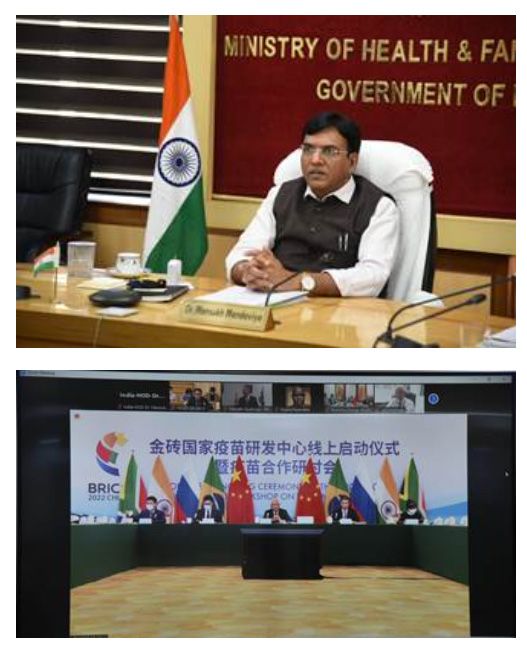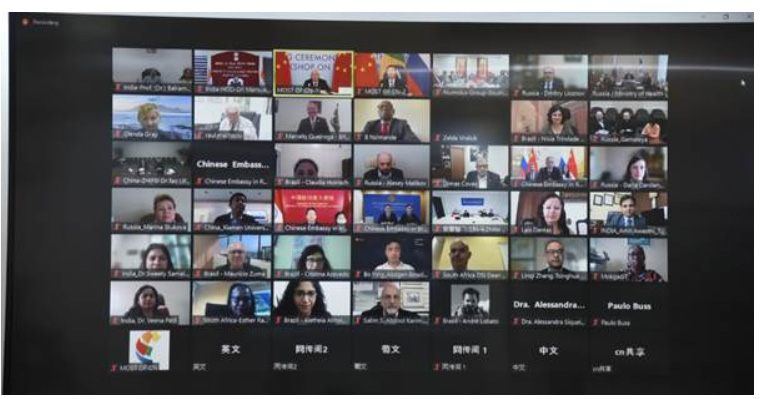“Given India has one of the world’s largest vaccine manufacturing industries which supplies vaccines to more than 150 countries and meets 65-70% of WHO’s vaccine requirements, India is willing to offer its robust vaccine manufacturing industry for developing vaccines for BRICS (Brazil, Russia, India, China and South Africa) countries as well as the world.” Union Minister of Health and Family Welfare, Dr. Mansukh Mandaviya said as he launched the BRICS Vaccine R&D Center and Workshop on Vaccine Cooperationthrough video-conference, here today.

Dr. Mandaviya highlighted that “This Centre will help to pool together complementary advantages of BRICS countries in vaccine research and development and boost the capacity of BRICS countries to prevent and control infectious diseases and provide timely help to other developing countries in need.” It will should entail basic R&D, preclinical &clinical studies and strengthen BRICS countries laboratory capacities to develop and standardize assays for testing vaccine candidates. He added that “The Centre will be instrumental in streamlining vaccination resources and facilitate equitable access to safe and efficacious COVID-19 vaccines”.
The Union Health Minister highlighted that the “BRICS Vaccine R&D Centre is a welcome initiative to collaborate with countries, share experiences, build collaborations for mutual benefits and accelerate development of vaccine of public health importance. This will enable saving lives and livelihood to propel us towards economic recovery for the citizens of BRICS countries and the world.”
At the virtual launch, Dr. Mansukh Mandaviya conveyed his gratitude and appreciation towards BRICS countries for collectively undertaking scientific efforts towards research and development of vaccines. “Amidst a global pandemic, I appreciate BRICS presidency for coordinating the launch of this Centre. This is a testament of the commitment of BRICS countries towards global pandemic response”, he stated. The Union health Minister applauded all those who have worked towards vaccine research and development. “I would like to convey my gratitude and appreciation for the relentless efforts of health professionals, scientists, researchers, drug regulatory authorities, and policy makers locally and globally, who have served as the backbone of the health system and vaccine development since the onset of pandemic”. He further stated that development and approval of safe and effective vaccines for COVID-19 in less than a year after the emergence of theCOVID-19 virus is an incredible scientific achievement and has shown us about what is possible in future vaccine development.”

Dr. Mandaviya stated that WHO’s R&D blueprint and International Health Regulations should be the guiding principles for this Centre and further proposed that “BRICS countries should work together to support endeavors such as ACT-A, COVAX, CEPI, etc., to achieve the WHO’s laid target of vaccinating 70% of the world’s population with COVID-19 vaccines by mid-2022.” He added that “apart from pandemic and health emergencies, there is an ample scope of collaboration among countries like in the field of vaccine preventable diseases with high morbidity and mortalityand for those diseases withno vaccines available currently such as AIDS, TB etc.”
Elaborating on the country’s capabilities and success of the world’s largest COVID-19 vaccination drive, Dr. Mandaviya said that India has so far administered of more than 1.81 billion vaccination doses. This wouldn’t have been possible without a robust and favorable ecosystem of vaccine R&D in the country, he stressed. “India has also so far approved 9 vaccines for COVID-19 emergency use, of which 5 are indigenous. This also involves world’s first of a kind m-RNA vaccine Gennova that has been developed indigenously, and produced outside WHO transfer technology program”. He said that vaccine industry in India functions in a dual mode—De-novo product development i.e., within the country and technology transfer through local-global partnership. He invited stakeholders to collaborate with India as “we have prioritised strengthening vaccine research and development efforts for diseases of local as well as global relevance.”
With the commitment of BRICS countries towards strengthening their cooperation in various fields, special emphasis was given to vaccine research and development. In this regard, a BRICS Vaccine R&D Centre was proposed to be established in 2018 Johannesburg Declaration. Over the years and especially throughout the pandemic, this process was expedited and finally in New Delhi Declaration of XIII BRICS Summit, leaders reiterated their commitment towards the early launch of BRICS Vaccine R&D Centre in virtual format.
With the support from the BRICS governments, each BRICS country has also identified their national centers, namely Immunobiological Technology Institute (Biomanguinhos) of the Oswaldo Cruz Foundation (Fiocruz), Smorodintsev Research Institute of Influeza, Indian Council of Medical Research (ICMR), Sinovac Life Sciences Co. Ltd, South African Medical Research Council.
The ceremony was chaired by Mr. Wang Zhigang, Minister of Science and Technology, People’s Republic of China who urged countries to focus upon promoting fair and equitable distribution of vaccines and to promote synergies among BRICS countries through this centre and other such initiatives. Apart from cooperation in vaccine R&D and their experiences in COVID-19 management, the panel discussed strategies to deal with future pandemics cooperatively among BRICS countries.
The meeting was attended by Mr. Marcelo Queiroga (Health Minister, Brazil), Mr. Mikhail Murashko (Health Minister, Russia), Dr Blade Nzimande (Minister of Higher Education, Science and Innovation, South Africa), delegates, senior representatives and research experts from BRICS countries.